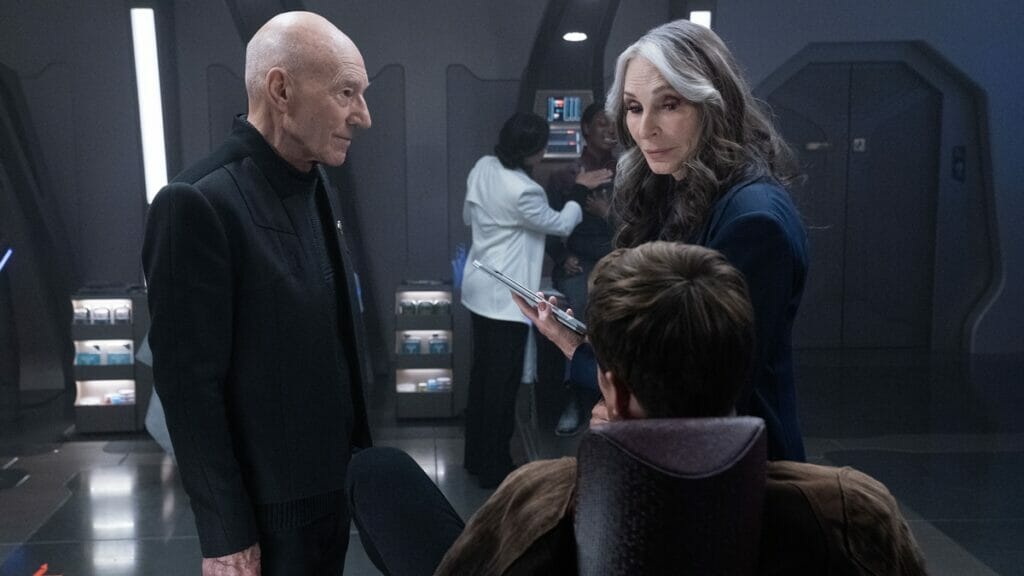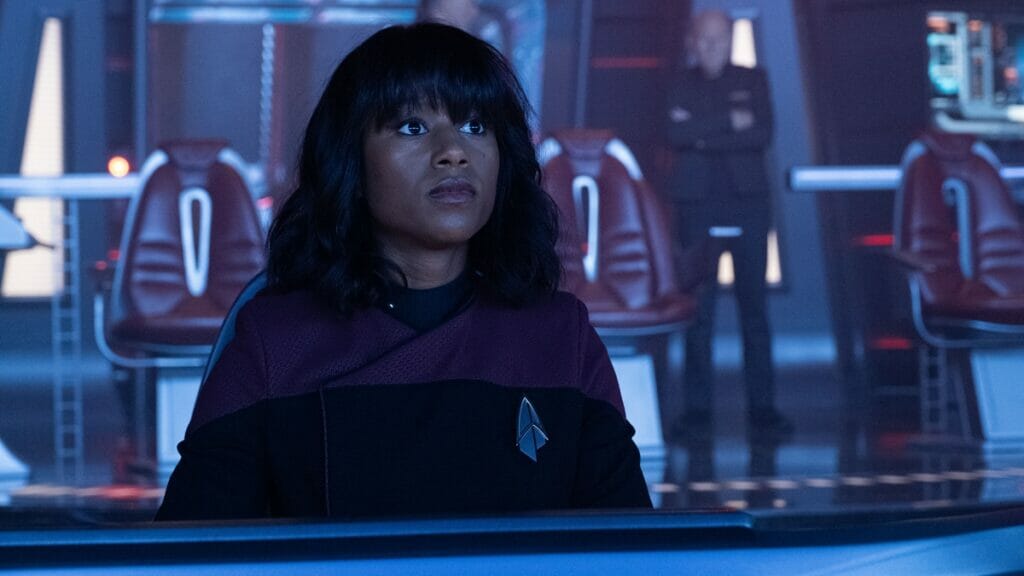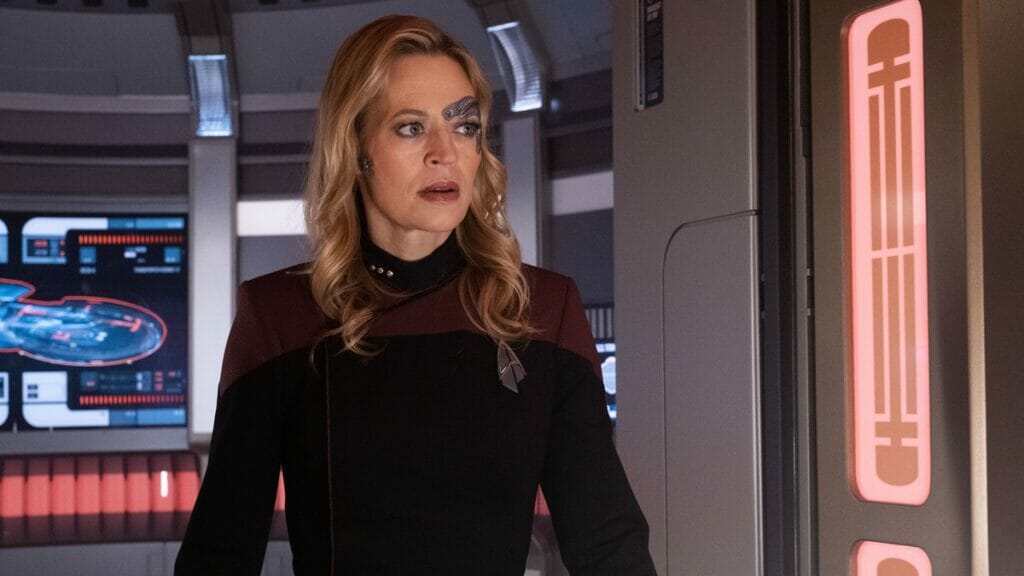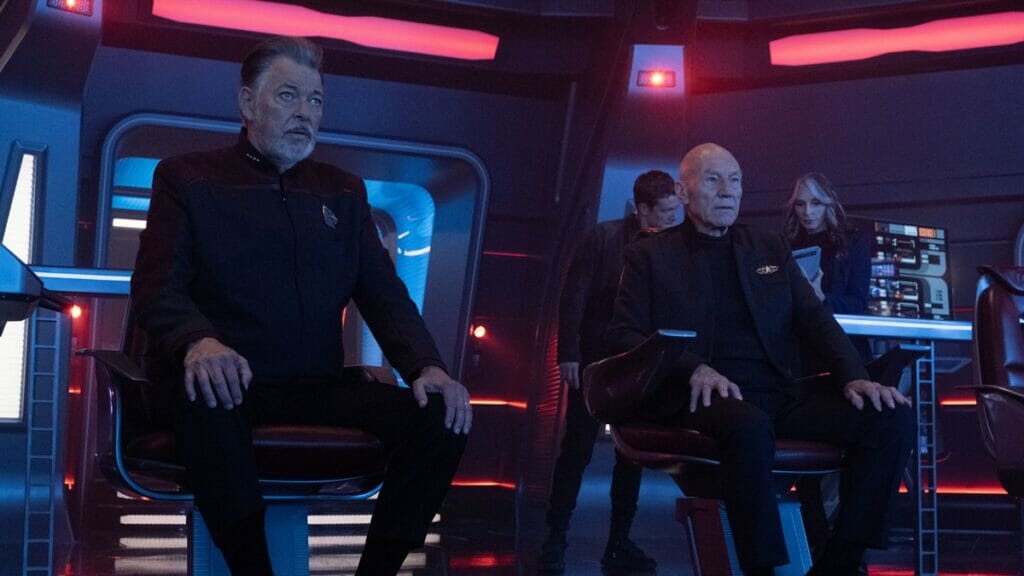Read also:
How to Watch FX Live Without CableHow To Watch AMC Without CableHow to Watch ABC Without CableHow to Watch Paramount Network Without CableA classic case of Star Trek problem-solving pays tribute to the rhythms and the friendships that made The Next Generation tick.
Back in the good old days of The Next Generation, viewers knew that the crew would survive the weekly mortal threat. Sure, they might kill off Tasha Yar when the actress wanted off the show or blow up the Enterprise in the first act before it’s reversed through science or magic. For the most part, though, no matter how dire the circumstances, savvy viewers could depend on Captain Picard (Patrick Stewart) and his allies using every bit of their pluck and guile to find a way out of trouble. What mattered more was the how and the why of it.
“No Win Scenario,” the fourth episode of Star Trek: Picard’s third season, recognizes that. The episode is the closest the current series has come to an old-school TNG adventure. Vadic (Amanda Plummer) stands the Titan in the gravity well of a mysterious nebula. The odds seem impossible. True to form (and this season’s Wrath of Khan influences), the characters declare it a no-win scenario. Four hours to live! No way out! Abandon all hope ye who enter here! And all that jazz.
 Paramount+)" class="wp-image-40559"/>
Paramount+)" class="wp-image-40559"/>Of course, Picard and company end up surviving. After all, there are six more episodes worth of Paramount+ subscriptions to sell. But escaping the crucible that is this living nebula requires some good old-fashioned Starfleet problem-solving.
So, of course, Dr. Crusher (Gates McFadden) comes up with the standard “Like putting too much air in a balloon!”-style analogy — the gravity well is actually a womb. Jack (Ed Speleers) figures out that its “contractions” produce energy bursts that the Titan can harness to recharge its batteries. And the rest of our heroes discern that they can open up the plasma coils to do just that and then navigate through the convenient asteroid field manually, riding the energy wave to safety. Easy peasy!
As in the old days, you can’t think too hard about this stuff. (And the optics of Beverly recognizing the nebula as a womb aren’t great.) But just like in TNG, the situation passes the smell test for soft sci-fi and conveys the crew’s ingenuity. They work together to solve impossible problems with creative solutions forged through collective reasoning and teamwork that blooms, rather than withers, in tight spots.
 Paramount+)" class="wp-image-40556"/>
Paramount+)" class="wp-image-40556"/>That is what elevated so many of those now-hallowed stories from 1987 and beyond — not merely the mechanics of the solution but the communal spirit and partnership among the denizens of the Enterprise to achieve it. Much of the joy of The Next Generation wasn’t simply seeing the enemy-of-the-week neutralized but rather watching this team of uber-talented colleagues and friends pooling their efforts and working seamlessly to make it happen.
The loud-and-proud theme of “No Win Scenario” is that idea in micro and macro. The lesson imparted by Jean-Luc, both in flashbacks and now, is that it’s not individual heroics that gave him all his accolades but instead the ability to connect with and rely on others. Despite personal differences and individual challenges, the allies aboard the Titan come to trust one another and form a whole greater than the sum of its parts in the process.
Their success even relies on the contributions of the prickly Captain Shaw (Todd Stashwick), who hotwires the nacelles so they can take in the nebula’s power. Likewise, crafty Seven (Jeri Ryan) fends off a Changeling saboteur. Given all the other fireworks in this episode, the Deep Space Nine-tested, Sisko-approved shapeshifter hunt has less time to bloom. Still, the fleshy graphical update to the Founders’ pulpier form is a welcome one, and Seven’s ability to recognize the interloper ties into the episode’s theme of trust.
The episode is the closest the current series has come to an old-school TNG adventure.
When young Ensign LaForge (Ashlei Sharpe Chestnut) appears in the nacelle chamber ready to help, the young pilot puffs up her connection to her legendary father. The boast signifies that something’s up, and her calling the former Borg “Commander Hansen” rather than “Commander Seven” seals that she’s a Changeling. Seven’s confidence in blowing away this conniving interloper is founded on having built a rapport with her fellow crewmate, the type of bond that makes it harder for any rogue agent or enemy to get the better of our heroes.
And yet, the episode is as much about the bonds that are in need of repair as the ones that remain strong. That starts with Shaw, who pulls another Sisko and airs his grievances over Picard decimating his ship and crewmates as Locutus. Shaw is still more asshole than charming, to paraphrase the man himself. But his story about being randomly chosen for the escape pod, despite being a “dipshit engineer” and the lifetime of survivor’s guilt that ensued, humanizes him. He has a reason for all the grief he gives Picard.
Nonetheless, despite his enmity for Jean-Luc after the Battle of Wolf 359, Shaw answers Picard’s call for help. He proves instrumental in escaping from the gravity well, suggesting that whatever his hang-ups, his seemingly random survival of that tragedy came with a purpose that reaches him in the here and now.
 Paramount+)" class="wp-image-40558"/>
Paramount+)" class="wp-image-40558"/>He isn’t the only captain aboard the Titan touched by tragedy. “No Win Scenario” gives Will Riker (Jonathan Frakes) the biggest spotlight he’s had since the series began. He speaks not only of the emptiness that consumed him after his son’s death but how it blunted his relationship with Deanna and Kestra. Loss left him closed off, isolated, withering without the sustenance of openness to his family.
Only now, his own near-death experience (or the latest one anyway), the chance to see a wondrous birth and the kind of miraculous experience only their journey through the stars can provide, cracks him open again. The beauty of him confiding in Deanna again, promising to fix it, to affirm the connections he’d let go of in the wake of grave loss, is the most moving part of this exciting outing.
Yet the most rousing may be Picard summoning the bond he had with a dearly departed best friend via the long-lost son who bears his name. The writers are a little too cute with Jean-Luc’s recollection of a misadventure with Jack Crusher Sr. translating to a method that helps the whole crew survive in the present. Nevertheless, the power of Jean-Luc sharing his wilder and more vulnerable days as a young man with Jack Jr., while the latter helps bring it to bear in the current moment, with one more “Engage!” to boot, cannot be denied. There’s a simplicity to the writing in this episode, despite how much takes place within the nearly hour-long installment, and in the end, that’s a feature, not a bug.
 Paramount+)" class="wp-image-40557"/>
Paramount+)" class="wp-image-40557"/>Because some connections need the chance to reform. The twist to the flashbacks of Jean-Luc in Ten Forward, enrapturing a collection of young officers with tales of his exploits, is that Jack Jr. was there the whole time. And when he chimed in to ask if he had a family beyond crewmembers and fellow officers, Jean-Luc responds that Starfleet was “the only family he ever needed.”
The pronouncement is a bitter pill twice over. Jean-Luc’s words answer the question of why Jack never sought him out to try and forge a relationship, and the look on his face in the present shows how much the realization devastates him. But longtime fans also know that it’s false that Picard cared for his real-life family like his brother and often wondered what he’d lost by not starting one of his own. Here is a missed connection, one that denied two men five years of bonding and solace they might have had.
And yet, here they are nonetheless, on the bridge of a starship, saving the day not as two individuals but as part of a trust that stretches across generations and forges confidantes and friends when it counts most. The appearance of what seems like baby jellyfish aliens a la “Encounter at Farpoint” gilds the lily a bit, but the moral of the moment rings true. It’s never been about whether the good guys would escape the latest bit of danger. It’s always been about the collective creativity and shared purpose that gave them the strength to do just that and the trust and connections between them that made so many glorious stories possible in the first place.